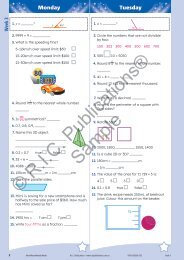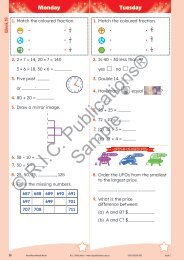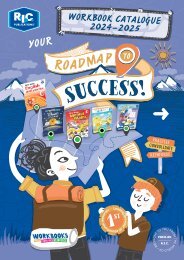PR-0552UK Primary Science - Book 2
Create successful ePaper yourself
Turn your PDF publications into a flip-book with our unique Google optimized e-Paper software.
Saving water<br />
Caring for my locality ~ Activity 7<br />
Objectives<br />
• realise that there is both an<br />
individual and a community<br />
responsibility for taking care of<br />
the environment<br />
• identify, discuss and implement<br />
simple strategies for improving<br />
and caring for the environment<br />
Working scientifically<br />
• Questioning<br />
• Observing<br />
• Predicting<br />
• Investigating and experimenting<br />
• Recording and communicating<br />
Background information<br />
Our lifestyle depends upon a clean,<br />
plentiful supply of water.<br />
Water is a precious and limited<br />
resource. The demand for this water is<br />
greatest during the summer months.<br />
‘Water-saving’ is a very efficient way<br />
to reduce our use of water. This<br />
stretches our supplies further and<br />
protects our supply sources. Using<br />
less water also reduces pressure<br />
on our sewage treatment facilities<br />
and requires less energy for water<br />
heating. The water we use comes<br />
from surface water (reservoirs, lakes<br />
etc.) or ground water (aquifers).<br />
Water is used to transport food and<br />
oxygen in and out of our cells. Water<br />
is also used to remove waste from<br />
the cells of our body. The importance<br />
of water to life is demonstrated by<br />
the fact that humans can do without<br />
food for several weeks, but cannot<br />
survive without water for more than<br />
a few days.<br />
The chemical process known as<br />
photosynthesis, by which plants<br />
create food, requires water. Water<br />
can be a destructive force as well,<br />
causing erosion. There are many<br />
useful Internet sites with water-saving<br />
ideas.<br />
Before the lesson<br />
Materials needed<br />
• Stimulus pictures of places with dry climates, magazines to cut out pictures,<br />
large sheet of art paper per pupil, water aids (tap, shower head, tap washers,<br />
washing up dish).<br />
Preparation<br />
• Have all the material ready; set up the water aids to demonstrate.<br />
• Check with the canteen/kitchen if you are visiting.<br />
• Contact the local water authority to see if they can help with printed or video<br />
resources or visits. (Optional)<br />
The lesson<br />
Stimulus<br />
• A visit to a kitchen (school canteen or nearby home) would allow the pupils<br />
to see firsthand the water-saving ideas which are being discussed. (The more<br />
practical demonstrations the pupils can see, the more effective this lesson<br />
will be.)<br />
What to do<br />
• Show pictures of dry places. Discuss and allow pupils to answer Question 1.<br />
• Discuss ideas for water conservation.<br />
• Discuss and demonstrate the ideas promoted on the worksheet.<br />
• List suggestions on the extra ideas and direct pupils to complete those of their<br />
choice.<br />
• Allow pupils to plan their posters.<br />
• Pupils can create their posters on a separate sheet of paper, using a variety of<br />
media and aids.<br />
After the lesson<br />
Answers<br />
• Teacher check<br />
Additional activities<br />
• Learn about the water cycle.<br />
• Keep goldfish in a bowl and discuss the quality of water needed to sustain<br />
life.<br />
• Pupils can prepare talks using their poster and other aids. With the poster as<br />
a central part of the design, pupils could also collect pictures of those items<br />
which are heavy water users and those which are water-saving, and create a<br />
collage.<br />
• Collect the water dripping from a tap for an hour and measure the amount.<br />
(Make sure you use the water afterwards.)<br />
Viewing Sample<br />
Display ideas<br />
• The posters would make a good display in the library or administration area.<br />
112 <strong>PR</strong>IMARY SCIENCE ~ Prim-Ed Publishing ~ www.prim-ed.com


















